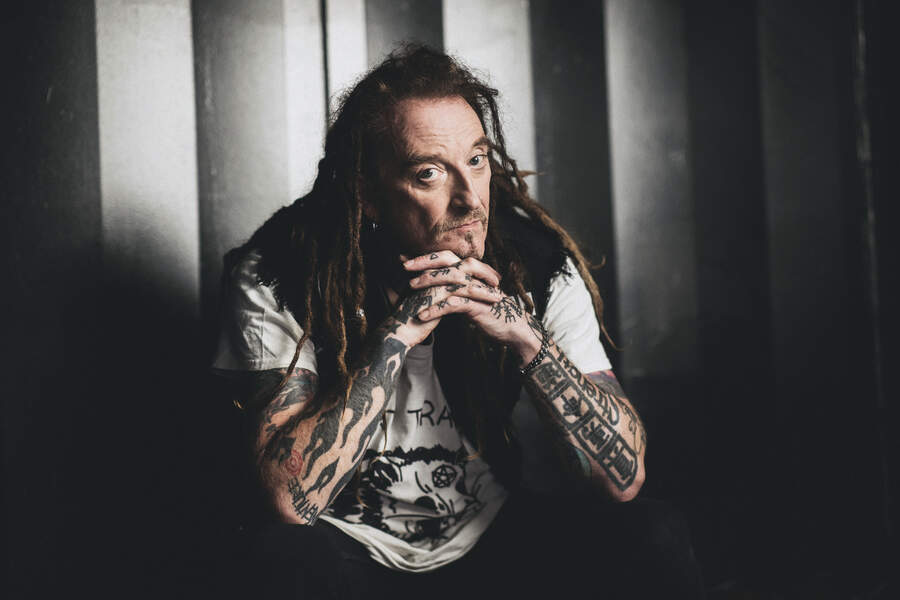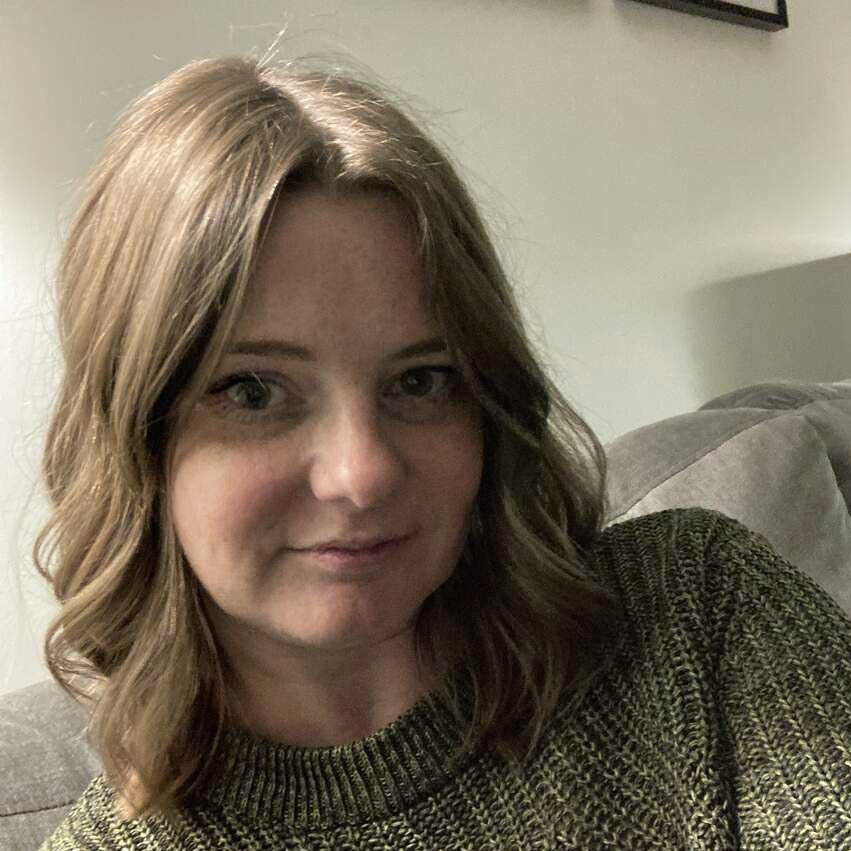In a lofty position in the Yorkshire Dales lies Britain’s highest pub, Tan Hill Inn, which sits 1,752 feet above sea level. The nearest town, Richmond, is a drive away, and today, in the depths of winter, locals and tourists are happily snowed in, making new friends, sampling the establishment’s beers, and whiling the hours away with card games and conversations.
It’s remote, sure, but go even further, deeper along farmers’ tracks into the countryside and you’ll find a large, pretty, truly isolated country cottage, miles from anywhere. And this is where, via Zoom, we meet Ginger Wildheart. It was supposed to be an in-person chat but he, too, is snowed in, with only his beloved border collie Maggie – his “soul mate”– for company. “It’s the sort of place where you go missing and no one finds you for years,” he says.
He’s been living there for a year and a half, having moved away from the relative bustle of York. Instinct says that this might not be the best environment for someone who has publicly battled severe mental health issues – something he has been commendably open about. In 2023 he was sectioned and placed on suicide watch, so concern over the isolated nature of his new home and lifestyle is natural. But it seems to be working for him, a brave and risky move he says he had to make.
“I needed to learn how to live with mental health and how to live with depression,” he explains. “I’d been chewed up, spat out, chucked around the system for years. Medication is not going to fix anything. I need to go away and figure out what depression is, trying to understand it, instead of just coping and living with it. Because the system offers you drugs that numb you and gives the impression that life’s got better, but it hasn’t. So I came in here with lots of boxes, and I had to just open them one by one. I looked in the mirror, I made an inventory of all the things that I hated about my life and then started fixing them.”
The first of those boxes was an intense fear of being alone, being away from everything and everyone he knew. Having reached a point where, he says, he was likely to end up in jail or six feet under, rather than avoiding that fear he faced it full-on.
“I wondered what you would do if you were left with only you and your head,” he says. “And the option is you would learn to live in your head. For years I’ve been masking it with alcohol and drugs. How do I exist by myself? I thought, well, there’s only one way of finding out, and that’s to chuck yourself feet-first into the abyss and build your wings on the way down. I’d gone as mad as I want to go, and I was getting into a lot of trouble. I had huge suicidal ideation. It got so far down it looked like up to me.”

So, country living it was. Out in the wilds, Ginger has spent his time studying Buddhism – something he’s long held an interest in, but which fell by the wayside when the booze was on the table – and stoicism, getting healthy and sober, walking for miles with the dog, getting fit, working out his own thoughts, his own deep-held anger issues. Getting his lungs full of fresh air and taking time to watch the wildlife. Writing a journal has helped, too. Taking a year “to be a ghost” seems to have hit just the reset button he needed.
“There was this one time I was in the studio, making the last album,” he remembers, “and I ran out of medication, and it was like being a smackhead again. I couldn’t work without the medication. At that point I’m like, this has got to change. So I spent a year coming off medication, which I had been a slave to for a long time, and just, you know, small steps, but in the right direction.”
The last album he refers to was 2021’s excellent but fraught 21st Century Love Songs, which saw the classic Wildhearts line-up of Ginger and CJ on guitar, Danny McCormack on bass and Ritch Battersby on drums. The re-formation was a cause for celebration among devotees, but, without going into too many details, Ginger makes it clear that this combination won’t be back together any time soon; too much murky water under the bridge, too many resentments and clashes. Some people just aren’t meant to be together, whatever the artistic outcome.
The great news is that he’s back with a new iteration of The Wildhearts, and the searingly honest but irrepressibly joyous The Satanic Rites Of The Wildhearts. A blaze of songs that takes in a million directions at once, with The Wildhearts’ instantly recognisable blend of crazed pop and fiery rock, it deals with all the issues the frontman has laid bare today and before, but with a sense of hope and positivity at its core.
“I used to think that I wasn’t allowed to do The Wildhearts without the rest of the [original] guys in the band,” he says. “I had to maintain some kind of allegiance. It’s a long story, but it ended up so bad – it was a terrible end to the band, it got so ugly – and I wanted nothing to do with it. In fact I left, and I was being paid as a session player to sing my songs. I gave all the control back to the band, still hoping that it would work this time. You know, that grim sense of hope that just… be better. And it wasn’t. It felt like an abusive relationship for everybody, and I think everyone would agree that they’re much happier now.”
Ginger beams when the subject of the new lineup is raised. There’s bassist Jon Poole, a familiar face to Wildhearts fans (“He’s just a magical entity, the funniest man I know”), guitarist Ben Marsden (“An absolute Duracell battery of a person”), and a new drummer named, singularly, Charles (taking over from Gong’s Cheb Nettles, who played on the album). It is, he says, the first time he’s experienced real camaraderie in the studio with The Wildheats, particularly on swearily hilarious collaborative rant Kunce.
“I don’t think people realise how much I did and how little the rest of the band did, as far as the creative side goes,” he explains. “I’m used to working alone. I’m used to being responsible for everything, and it not being a very fun experience. And this was a fucking brilliant experience. It’s odd to be doing this for a living and laughing all the time. That it’s okay to enjoy it this much.
"We also had [prog hero and Gong alumni] Kavus Torabi as a guest on the album. Him and Jon were just like putting two foul-mouthed Furbies together. It was great, there was a lot of musical collaboration, which is what I really want. I wanted people to bring things to the table. This is something that I’m not used to with The Wildhearts.”

At the other end of the scale there’s Fire In The Cheap Seats, a portrait of a turbulent mind that serves as a reminder of how pioneering The Wildhearts, and Ginger in particular, have been over the years in opening up the discussion on mental health, particularly among men. It’s thankfully more common now, but back in the 90s it was groundbreaking.
“At a time like now where people are being convinced by people like Russell Brand and Andrew Tate, it’s just telling a man: ‘It’s okay to cry. It’s okay to suffer. It’s okay to ask for help. It’s okay to feel like you failed, like you’re on the bottom of your world,’ and ‘You can build yourself back up.’ That’s a more important message than: ‘Hate women because you’re stronger physically.’ We are trying to lead by example. It’s a story of someone getting through life by whatever means necessary, and I think it’s a sentiment that’s shared by a lot of Wildhearts fans. We don’t have misogynist, homophobic racists in our community.”
The Wildhearts’ fans, perhaps uniquely, are as crucial an element to The Wildhearts story as any band member. It’s a collective, a support network, organically and unpretentiously populated by people who genuinely care for one another, and it’s a beautiful thing to witness. Live shows represent a community coming back together to reconnect – less a fan base, more a found family created by the man at the heart of it all. It’s a light surrounding the frontman when things seem their darkest.
“Music has always been my best friend, my therapist, my confidante and my means of communication, my connection with people,” Ginger says. “I’ve never made a secret about The Wildhearts being all about the community. We started with a handful of people, making sure everyone’s mental health was alright, everyone’s feeling strong, everyone feeling supported, and it’s got bigger and bigger. The whole thing not only gives people a bit of hope, it gives me hope.
"There’s times when I’ve needed the community, and therapists haven’t done it, psychiatrists haven’t done it, medication hasn’t done it. And Wildhearts fans have come to my aid. I hear from a lot of people that the music’s helped them. And it’s a two-way street. They absolutely help me. Music is the connection, and it’s magical and it’s real.”
The public-access nature of the band extends to the music itself. Ginger says he never sits down to write, never picks up the guitar at home, never goes back and listens to the songs once they’re recorded. (“Once it’s done, it’s for other people, it’s not for me then.”) The songs just arrive fully formed in his head, these days usually when he’s out walking in the fields. Maybe that’s why they’re so catchy, they’re built already embedded in the brain. He’s already got 12 ready to go for the next Wildhearts album, way ahead of the current one being released. “Once they started coming, they started coming. And who am I to argue with that?”
It sounds like taking himself off to be the wild man of the Yorkshire Dales has paid off in spades. With Maggie a constant and faithful source of comfort and love by his side – on the tour bus, in the studio, at acoustic shows – his search for peace seems to be heading in the right direction, at least. The countryside, with the scent of the earth and the sound of the birds, the clean, life-giving air and nature’s cool indifference to human struggles and endeavours, has become a muse, not just for the music but also for life.
“Working on yourself, demanding that things be better, I’ve lost quite a few friends because of that, and that’s been food for thought,” says Ginger. “But you learn a lot being surrounded by trees, to the point where I feel more like a tree than a human. Just being surrounded by no bullshit, no lies, no ego. There’s just honesty. Nature’s got it right, it’s not a terrible world. We’re a blight on the bloody planet, but nature’s got it all right.
"When you get a level of communication with a wild animal where they don’t fear you, you’ve got something really special going on that you don’t get in society. When you raise your energy to match nature, you find that you’re in a good place where you’ve got a good overview of things. The only hope is that you can just go back out into the illusion of society and try and put it into practice.”
Outside the cottage, things are silent, the snow banked up, indifferent to anyone who may have things to do, places to go, people to see. It’s a good place to take stock, and from here, at the start of the year, Ginger declared on Instagram his one plan for 2025: to “aim for brilliance”.
“Why would you want anything else?” he asks. “Aim for happiness. You can change your life completely. I’ve manifested this to the point where it’s too late to get off the fucking train. Now it’s all starting to happen. And it’s fascinating. But life isn’t an illusion, and the universe wants you to be happy, and when you take those two things into consideration, you can ask and demand anything from life. If you just appreciate every little step, it’s just a step in the right direction, and you’re manifesting happiness before you know it. You look around and go: ‘Fucking hell, this is all I wanted ten years ago.’”
Satanic Rites Of The Wildhearts is out now via Snakefarm.



